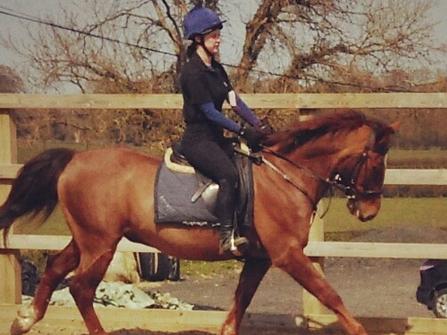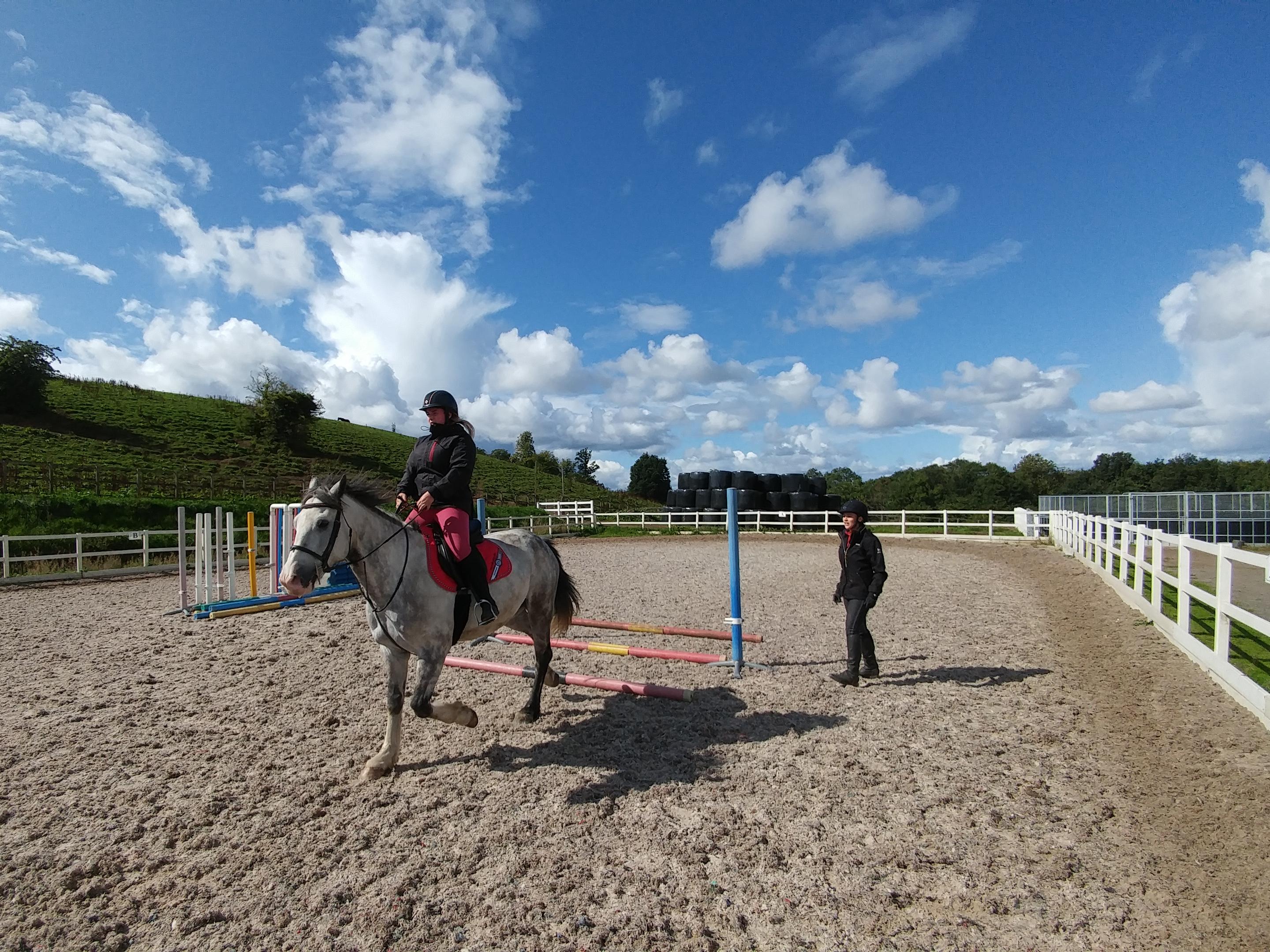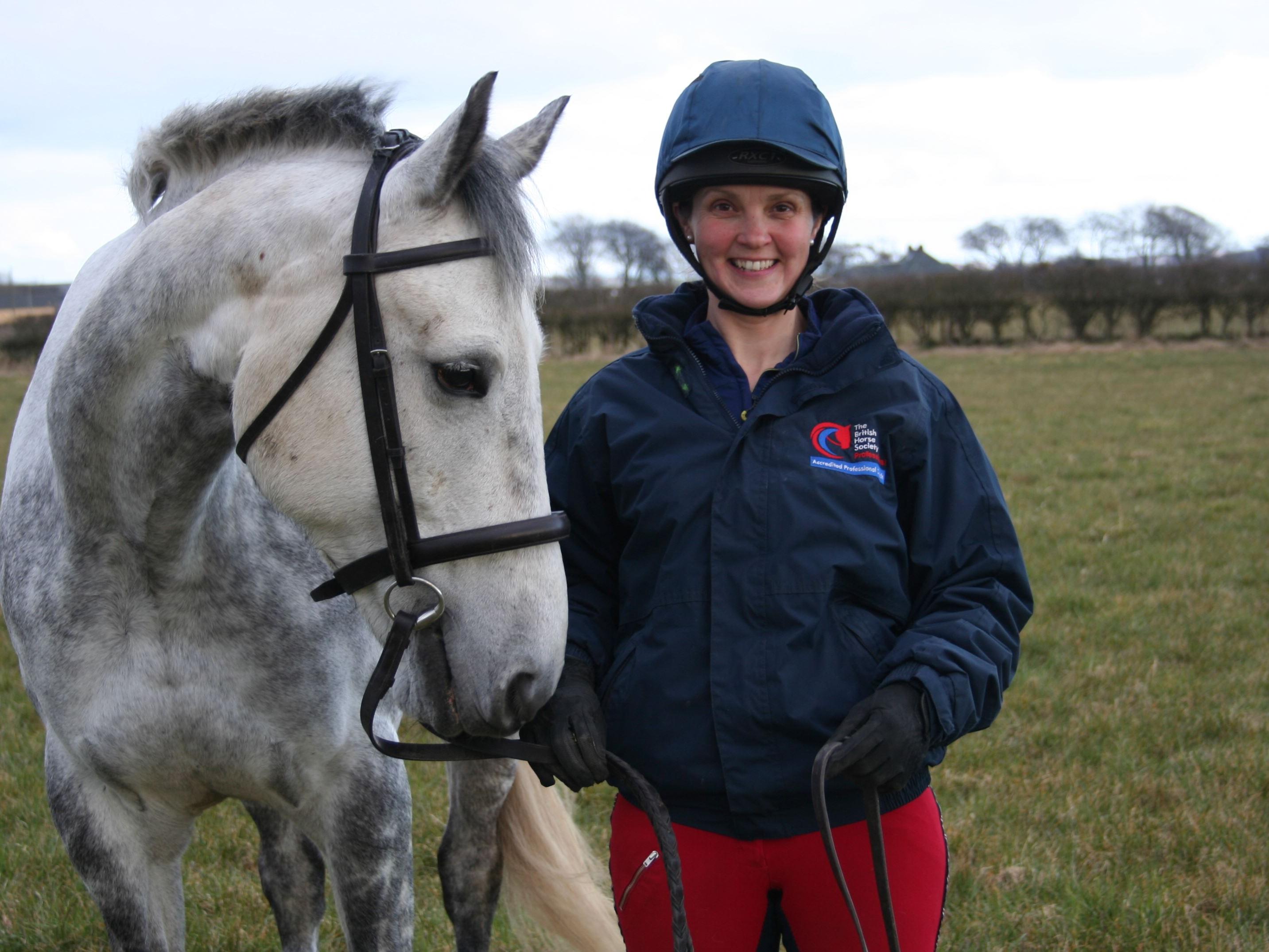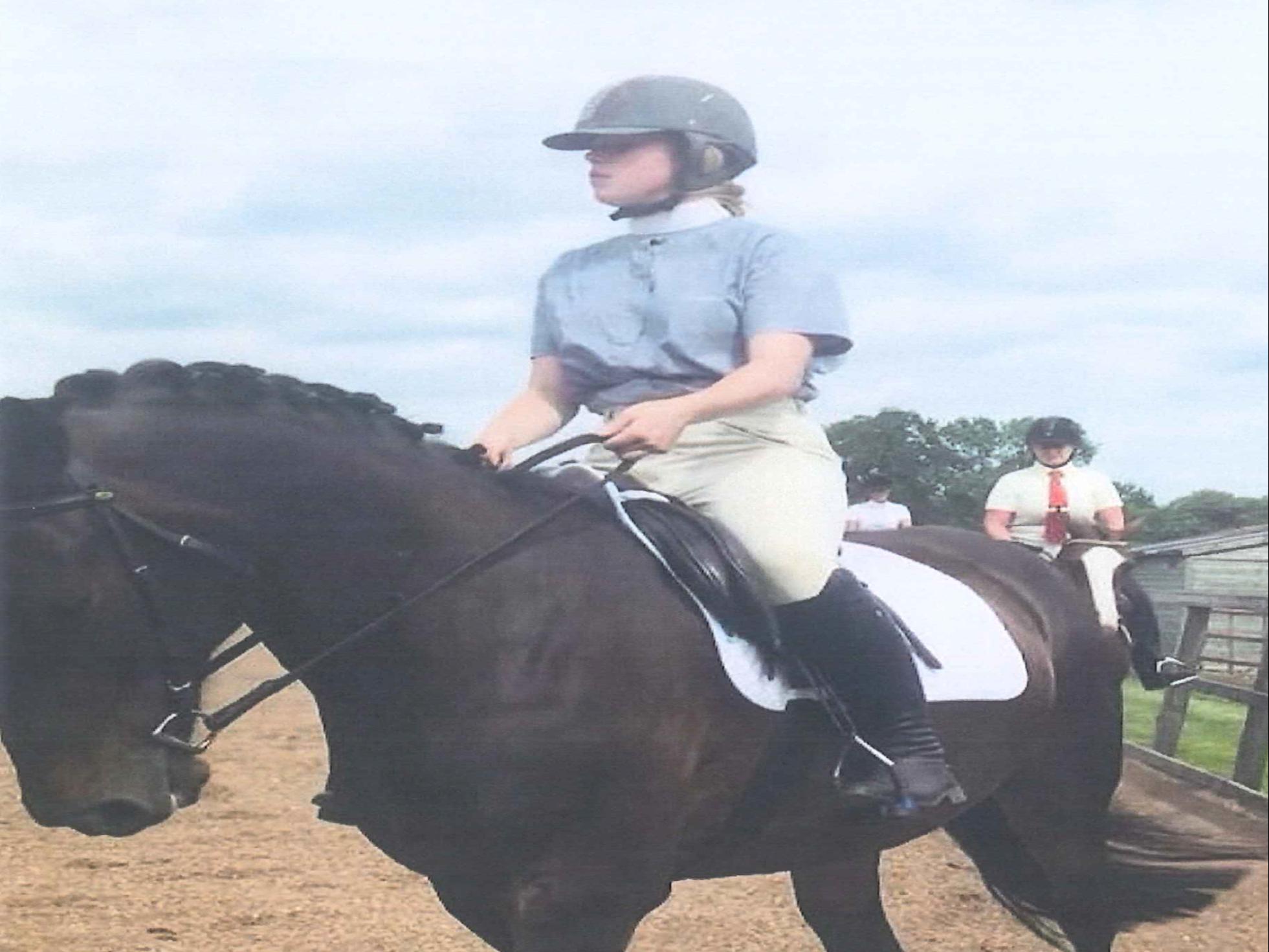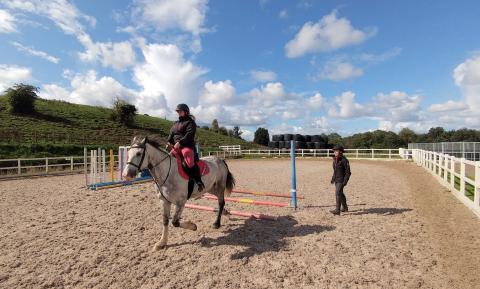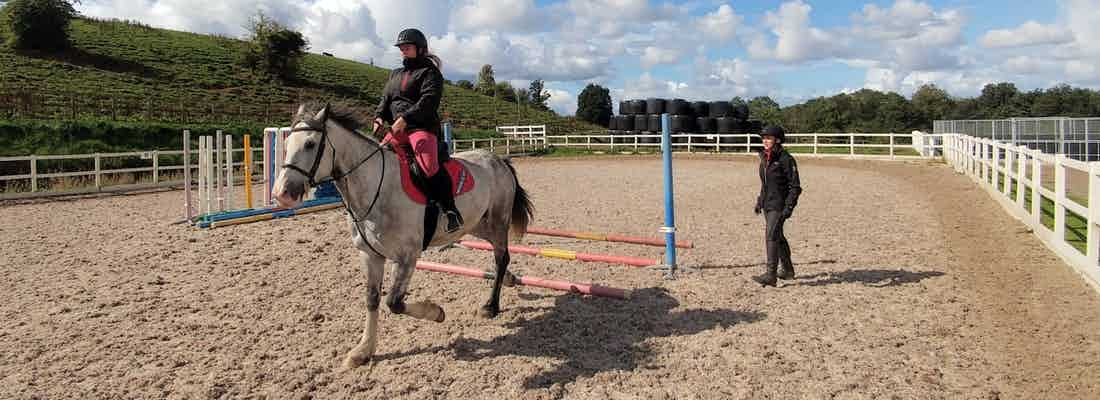
The equine industry offers lots of exciting and rewarding careers, from riding schools, competition and racehorse yards, to professional horse training, the armed forces and mounted police.
For a career in this industry you need to be skilled and dedicated and be willing to put in some hard work. If you love horses and want a job where you could work with them every day, a career in the equine industry could be for you.
Whether you want to work in livery yards, riding schools, or with saddlers or blacksmiths, you will be in regular contact with horses, so it’s important to choose the best career route. However, a real passion for horses will give you the motivation you need to work throughout the seasons. Whatever your preference might be, you will find a career here both interesting and rewarding.
SVQ Horse Care SCQF Level 5
Land-based Studies Certificate
SVQ Horse Care SCQF Level 4
Modern Apprenticeship in Equine SCQF Level 6
Modern Apprenticeship in Equine SCQF Level 5
Yard Manager
Yard Managers are employed by equestrian business owners to make sure the yard runs efficiently. They are responsible for the daily running of the yard, including managing staff, care of the horses, all aspects of health and safety and dealing with clients and owners. This role is mostly office based.
As a Yard Manager, you may work on various types of yards, such as competition, breeding, training, riding schools, racing and trekking. Your work would depend partly on the type and size of the yard.
On smaller equestrian establishments, you may have sole charge of a yard and do more practical work, such as looking after the horses, riding horses and yard maintenance.
In competition, hunting or racing yards, Yard Managers may also prepare horses for events and accompany them.
In stud and breeding yards, duties may also include:
- Working with stallions, mares and foals
- Assisting with foaling and handling youngstock
- Handling of mares and stallions during breeding, training of youngsters
- Running competitions
- Instructing
- Transporting horses’
- Promoting and marketing the establishment
- Liaising with owners/clients
- Driving HGV and non-HGV vehicles such as horseboxes, tractors and trailers.
Working Conditions
Yard Managers work around 40 hours a week but may work longer on occasions. Early mornings, late nights and weekend working is a common practice for Yard Managers.
Most of the work is outdoors, in all weather conditions and can involve lifting, carrying, bending, climbing and standing for long periods.
Equestrian businesses are often a long way from town, so a driving licence may be useful.
Due to location and the nature of the job role, some Yard Manager positions are ‘live-in’ and most involve travelling and staying away from home e.g. during competitions. If you hold a ‘live-in position you will have the overall responsibility of the yard and therefore may be called upon to respond to any emergencies or issues at any time day or night.
Salary
Some employers provide accommodation, food, free stabling for their employees’ horses and riding instruction, so individual salaries may vary.
£16,000
£24,000
Getting started
Yard Managers need plenty of practical experience with excellent organisational and communication skills and the ability to run a business. They will work throughout the UK and abroad.
You could this industry as an Assistant Yard Manager then progress with experience to become a Yard Manager.
Potential employers include riding schools, private stables, competition yards, college equine units, polo yards, livery stables, producers, stud yards, hunting yards, trekking centres, horse rehabilitation centres and the armed forces.
To improve employment opportunities you should gain experience working on a yard as a Groom or Yard Assistant for a number of years whilst specialising in a specific area such as breeding.
What experienced workers can do
- Maintain the health and well-being of equines
- Plan the running of the equestrian yard
- Recognise signs of equine illnesses
- Maintain records
- Manage budgets
- Communicate with others effectively
- Selecting, purchasing and selling of horses
- Recruit, train and supervise staff.
Personal qualities you should have
- Good communication skills
- Genuine interest in horses and their welfare
- Flexible about working hours and location
- Self-motivated
- Willing to undertake routine and practical tasks.
Next steps
With experience and relevant qualifications you may be able to develop your skills in a number of directions. This could provide you with more responsibilities with an existing employer depending on the size of the organisation, but you may have to move to another business.
Experienced Yard Managers may also become:
- Instructor/Coach
- Event Co-ordinator
- Trainer (Racing)
- Owner of a yard.
There may also be opportunities to work and train abroad.
Useful links
Association of British Riding Schools
Trek Leader Centre Operator
Jobs vary depending on the employer but the main tasks are usually:
- Assess riders' ability and confidence and choose horses or ponies to suit them
- Explain safety procedures and riding techniques, such as mounting, dismounting and halting
- Make sure that all riders wear appropriate clothing and follow safety procedures.
Trek Leader Centre Operators may also be responsible for:
- The care of horses or ponies
- Planning routes
- Making sure that tack is kept clean and in good order
- Checking the standard of grooming and the general care of horses and ponies.
Trek Leaders may have to organise yard staff and train Assistant Ride Leaders. They must also be able to take temporary charge of the centre when the owner or manager is away.
Working Conditions
Working hours tend to be long and can include evening and weekend work, especially during the main holiday period. Many Trek Leaders work part-time or seasonally. Most of the work takes place outdoors in all weather conditions.
Trek Leaders organise and run horse and pony riding activities, particularly treks and hacks across open countryside. They may work with groups or individuals and visitors can be first-time riders, through to experienced riders.
With the right qualifications there may be opportunities to work abroad.
Salary
Some employers provide accommodation, food, free stabling for their employees’ horses and riding instruction, so individual salaries may vary.
£12,000
£18,000
Getting started
Trek Leaders need good riding skills and experience of horse care and management. Some Trek Leaders have first worked as Assistant Trek Leaders escorting up to six riders on short rides, treks or hacks, and helping Trek Leaders on rides or treks which are longer or have more riders.
Volunteering and seasonal work can be a good way to get started.
What experienced workers can do
- Maintain the health and well-being of equines
- Maintain tack
- Restrain a horse when necessary
- Groom and clean a horse
- Recognise signs of equine illness
- Maintain records
- Map reading skills and familiarity with the local countryside
- Communicate with others.
Personal qualities you should have
- Have good riding skills
- Have good customer service skills
- Have good communication skills
- Be able to meet the physical demands of the job
- Flexible about working hours and location
- Self-motivated.
Next steps
Trek Leaders may progress into specific jobs such as in an equine tourism centre. They may also have the opportunity to progress to Yard Manager or Riding Centre Manager but this will depend on the opportunities available and may mean moving to another establishment.
Useful links
Association of British Riding Schools
Trek Assistant
A Trek Assistant will assist the Trek Leader in organising and running horse and pony riding activities, particularly treks and hacks across open countryside.
They may work with organised groups, individuals or small family units. Visitors can be first-time riders, novices or experienced riders.
A Trek Assistant may be employed at a riding or trekking centre.
Working Conditions
Working hours tend to be long and can include evening and weekend work, especially during holidays. Many Trek Assistants work part-time or seasonally.
Most of the work takes place outdoors in all weather conditions.
With the right qualifications there may be opportunities to work abroad.
Salary
Some employers provide accommodation, food, free stabling for their employees’ horses and riding instruction, so individual salaries may vary.
£12,000
£18,000
Getting started
Trek Assistants work throughout the UK, although most will be situated in scenic or remote locations.
No academic qualifications are needed to become a Trek Assistant but a real interest and enthusiasm for working with horses is very important. To get started it is often useful to have done volunteering or temporary work.
What experienced workers can do
- Maintain the health and well being of equines
- Maintain tack
- Restrain a horse when necessary
- Groom and clean a horse
- Recognise signs of equine illness
- Communicate with others
- Assisting the trek leader driving a trek
- Assisting with mounting and dismounting
- Map reading skills and familiarity with the local countryside.
Personal qualities you should have
- Have good riding skills
- Have good customer service skills
- Have good communication skills
- Be able to meet the physical demands of the job
- Have a genuine interest in horses and their welfare
- Flexible about working hours and location
- Self-motivated
- Willing to undertake routine, practical tasks.
Next steps
Trek Assistants can progress to the role of Trek Leader with further experience and training.
Trek Assistants could find work overseas, as the qualifications are recognised internationally.
Useful links
Association of British Riding Schools
Stud Manager
Stud Managers are employed by equestrian business owners to make sure the yard runs efficiently. They are responsible for the daily running of the yard, including managing staff, care of the horses, health and safety and dealing with clients.
As a Stud Manager, you could work on various types of yards, such as competition, breeding, training, riding schools, racing and trekking. Your work would depend partly on the type and size of the yard but you may be required to:
- Plan the running of the equestrian yard
- Plan the horses’ exercise routine
- Plan horses’ routine care and keep appropriate records for vaccinations, farrier, teeth and worming
- Purchase and maintenance of feed and equipment
- Keep appropriate records such as financial, insurance, accident reporting
- Conduct risk assessments
- Maintenance of grassland
- Select, purchase and sell horses
- Recruit, train and supervise staff.
On smaller equestrian establishments, you may have sole charge of a yard and do more practical work, such as looking after the horses, riding horses and yard maintenance.
In competition, hunting or racing yards, Yard Managers may also prepare horses for events and may accompany them. In smaller studs and breeding yards, duties may also include working with stallions, mares and foals, assisting with foaling and handling young stock.
Depending on your skills and qualifications, you may also have responsibility for other activities, for example running competitions, instructing, transporting horses, promoting and marketing the establishment and liaising with owners and clients.
Working Conditions
Stud Managers work around 40 hours a week but this may be longer on occasions. Early mornings, late nights and weekend working is common practice for Stud Managers. Work can involve lifting, carrying, bending, climbing and standing for long periods, and is mainly outdoors, in all weather conditions.
Equestrian businesses are often a long way from towns, so a driving licence may be useful.
Due to location and the nature of the job role, some positions are live-in, so managers may be on call to respond to any emergencies or issues on the yard.
Salary
Some employers provide accommodation, food, free stabling for their employees’ horses and riding instruction, so individual salaries may vary.
£14,000
£20,000
Getting started
You should have a genuine interest, knowledge and experience of working with horses and their welfare, enjoy working outdoors and have good organisational and leadership skills.
Stud Managers work throughout the UK and abroad. Employers include riding schools, private stables, competition yards, college equine units, polo yards, livery stables, producers, stud yards, hunting yards, trekking centres, horse rehabilitation centres and the Armed Forces.
What experienced workers can do
- Care for visitors
- Ensure a healthy and safe workplace
- Inspect horses for specific requirements
- Establish basic training
- Control and organise the breeding of horses
- Control and organise the rearing of young stock
- Control and organise foaling and care of the foal
- Oversee the sales preparation procedures.
Personal qualities you should have
- Have a genuine interest in horses and their welfare
- Good communications skills
- Good organisation skills
- Flexible and adaptable
- Self-motivated
- Have the ability to work alone and also as part of a team.
Next steps
With experience and relevant qualifications you could develop your skills in a number of directions. You may then get more responsibility with an existing employer, depending on the size of the organisation, but may need to find work elsewhere to progress.
Experienced Stud Managers may also become:
- Instructor/Coach
- HGV Driver
- Rider
- Event Co-ordinator
- Trainer (Racing)
- Stud Manager
- Business Manager.
Stud Managers wanting to also become riding instructors can take BHS or ABRS teaching qualifications.
There are opportunities to work and train abroad.
Useful links
Association of British Riding Schools


